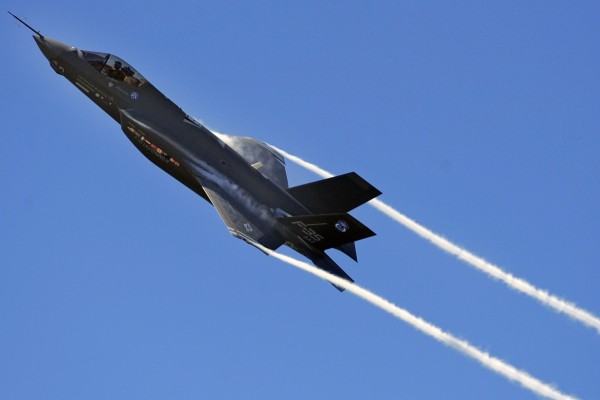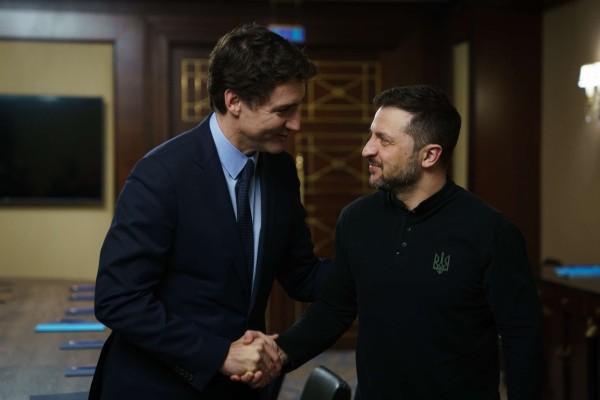Debunking the myth of Canada’s non-involvement in the Iraq war
Contrary to popular belief, Canada’s military support for the 2003 invasion of Iraq exceeded that of most coalition members

A damaged billboard of Saddam Hussein along a roadside as Coalition forces conduct operations in support of Operation Iraqi Freedom, March 2003. Marine Corps photo by Lance Cpl. Matthew R. Jones/Wikimedia Commons.
On March 19, 2003, the George W. Bush administration launched air attacks against the nation of Iraq, supposedly due to the Saddam Hussein government’s possession of “weapons of mass destruction,” and its assistance of the perpetrators of the 9/11 attacks. President Bush made his casus belli clear in a speech announcing the invasion: “[Hussein] has aided, trained and harboured terrorists, including operatives of al Qaeda. The danger is clear: using chemical, biological or, one day, nuclear weapons, obtained with the help of Iraq, the terrorists could fulfill their stated ambitions and kill thousands or hundreds of thousands of innocent people in our country, or any other.”
Ground troops landed on Iraqi soil the next day, and several weeks later, Baghdad fell to occupation forces. The invasion, a twin effort of the US and UK governments, lacked United Nations support and was condemned around the globe as an illegal act of aggression.
In his book Iraq, Afghanistan & the Imperialism of Our Time, the late Marxist intellectual Aijaz Ahmad recalls the staggering scope of anti-war sentiment and organization in the lead-up to the brazenly illegal invasion. The “anti-war surge,” he wrote on March 28, 2003,
runs all the way from the Pope to the UN weapons inspectors in Iraq, and from the largest labour confederations in Europe and the US to the governments of France, Germany, China, and Russia… Meanwhile, a special session of countries of the Non-Aligned Movement (NAM), the summit of the Arab League, and the Organization of Islamic Cooperation (OIC) passed unanimous resolutions rejecting the option of war.
The invasion, haughtily dubbed “Operation Iraqi Freedom,” was a massive theft of resources launched on false pretences by the US and its allies that had the world’s most powerful offensive weapons at their disposal. It was, to borrow from Joseph Conrad, “robbery with violence, aggravated murder on a great scale.” The moral hollowness lurking behind the actions of the Bush administration, as well as of Congressional Democrats, the Tony Blair government, and the Western mainstream media, in lying to, misleading, and manipulating a frightened public in the aftermath of an attack that killed more than 3,000 American civilians is still staggering in its scope and cynicism.
None of these officials have faced punishment of any kind for lying their way into a murderous, illegal resource grab that cost the lives of hundreds of thousands of Iraqis, thousands of US service members, and led directly to the creation of ISIS and the wider destabilization of the region.
On March 17, 2003, two days before the “coalition of the willing” launched its invasion, Canadian Prime Minister Jean Chrétien informed the House of Commons that Canada would not be participating in the war effort. His decision sparked criticism from the Bush administration and many conservatives within Canada. Stephen Harper, then leader of the opposition, unequivocally supported the illegal invasion in a Wall Street Journal article co-authored with Stockwell Day. Titled “Canadians Stand With You,” Harper and Day stated that the opposition “supports the American and British position because we share their concerns, their worries about the future if Iraq is left unattended to, and their fundamental vision of civilization and human values.”
Chrétien has since celebrated his decision not to formally join the invasion forces, hailing it as an important instance in which Canada acted independently of the US on the world stage. In March 2013, he stated: “Unfortunately, a lot of people thought sometimes that we were the 51st state of America. It was clear that day that we were not.”
Despite this nationalist posturing, the Chrétien government (and subsequently that of Stephen Harper) offered extensive material support to the US invasion. A WikiLeaks cable released in early 2011 reveals that on March 17, the same day Chrétien stood in the House of Commons and declared that Canada would not participate in the invasion, top Canadian diplomats met with their British and American counterparts and conveyed their willingness to support the attack behind the scenes. The classified document stated: “While for domestic political reasons… the GOC [Government of Canada] has decided not to join in a US coalition of the willing… they are also prepared to be as helpful as possible in the military margins.” The note explained that Canada would support American military initiatives in the region using its warships stationed in the Strait of Hormuz.
Following the meeting, political director Jim Wright emphasized that, despite public statements that the Canadian assets in the Straits of Hormuz will remain in the region exclusively to support Enduring Freedom [the invasion of Afghanistan], they will also be available to provide escort services in the Straits and will otherwise be discreetly useful to the military effort [in Iraq]… The two ships in the Straits now are being augmented by two more en route, and there are patrol and supply aircraft in the UAE [United Arab Emirates] which are also prepared to ‘be useful.’
In the aftermath of this note’s release, CBC News reached out to Paul Cellucci, the US ambassador to Canada in 2003. Cellucci stated that the note “sounds right.” He went on: “The message from the Canadians was pretty clear. We are not putting boots on the ground in Iraq. We will say good things about the United States and not-so-good things about Saddam Hussein. We will keep our ships in the Persian Gulf helping in the war on terror—and any way else we can help.”
Jean Chrétien and George W. Bush in September 2002. Photo by
Tim Sloan/AFP.
Cellucci’s response is hardly shocking given that, shortly after the US invasion began, the ambassador openly praised Canada’s contribution to the war effort (even though he groused over the Chrétien government’s public caginess). At a meeting of the Economic Club of Toronto on March 25, 2003, Cellucci stated that Canada’s military support for the invasion exceeded that of most coalition members: “Ironically, the Canadian naval vessels, aircraft and personnel in the Persian Gulf… will provide more support indirectly to this war in Iraq than most of the 46 countries that are fully supporting our efforts there.”
Even prior to March 2003, Canada did not have clean hands in Iraq. During the First Gulf War, Canada supported US bombings on Iraqi territory and offered logistical support to the attacks through its participation in the North American Aerospace Defense Command (NORAD), a Canadian-US surveillance and assessment sharing organization that, despite its name, operates worldwide, including in Europe, the Pacific, Africa, and the Middle East.
At the Clinton administration’s urging, the UN Security Council enforced a brutal sanctions regime against the Iraqi people during the 1990s. These sanctions, which prevented necessary food and medical supplies from entering the country, caused the deaths of over one million Iraqis due to malnutrition (including over 500,000 children). In 1996, Patrick Cockburn visited Iraq and recounted the desperation in Iraqi Kurdistan, a region “beyond Saddam’s control,” where people had been reduced to extracting the aluminum from live landmines and selling it in order to survive. Many had lost hands and feet in the process.
In 1998, UN Humanitarian Coordinator in Iraq Denis Halliday resigned due to UNSC support for the sanctions regime and described the blockade of Iraq as genocidal: “the [UNSC] member states…are maintaining a program of economic sanctions deliberately, knowingly killing thousands of Iraqis each month. And that definition fits genocide.”
Canada, for its part, was complicit in the enforcement of the sanctions regime of the 1990s, sending warships to the Persian Gulf to ensure that food, medicine, and other essential resources could not be delivered to the Iraqi population. This fact, paired with Canada’s support for the US during the First Gulf War, reveals that even if the myth of Canada’s neutrality in the 2003 invasion was true (which it isn’t), the country would still bear some responsibility for the West’s decades-long collective punishment of the Iraqi population.
In his latest book, Stand on Guard for Whom? A People’s History of the Canadian Military, Yves Engler notes that “While the Jean Chrétien government didn’t do what the George W. Bush administration wanted above all else—publicly endorse the invasion by joining the ‘coalition of the willing’—the CF [Canadian Forces] provided various forms of support to the US-led war.” In the lead-up to the invasion, at least ten Canadian naval vessels conducted “maritime interdictions, force-support, and force-projection operations in the Arabian Sea.” These vessels frequently provided platforms for US bombing raids into Iraq. Canadian pilots also flew AWAC surveillance planes that assisted US fighter jets over Iraq, and much like in 1991, Canadian war planners provided logistical support for US airstrikes through NORAD.
Numerous Canadian companies benefitted from the profitable opportunities engendered by the invasion force’s destruction of the Baathist state. Engler writes that “Montréal-based SNC Technologies Inc. joined a multinational consortium of ammunition producers providing occupation forces with 300 to 500 million bullets per year for five years.”
Nortel, an Ontario-based telecommunications company, benefitted from the wave of privatizations imposed on Iraq by occupation forces after the overthrow of the Hussein government. In 2006, the company won a US$20 million contract to construct a 5,000-kilometre fibre-optic cable network spanning the country. However, it must be recalled that the reason Iraqi infrastructure needed to be reconstructed in the first place was because of the massive US bombing campaign that Canadian forces helped facilitate. As Todd Gordon writes, “Were it not for the invasion and the destruction of Iraqi infrastructure that entailed (the country had an extensive fibre-optic network before the invasion), Nortel’s contract would not have been possible.” After beginning construction, Nortel relied on the US military and private military contractors to secure its assets in the country.
As the world considers the horrific legacy of the US-led invasion of Iraq, it is time we recognize that Canada was not the innocent bystander that it claims it was. Despite Chrétien’s nationalist grandstanding and the red-faced anger of conservative militarists who felt cheated out of some old-fashioned imperialist bloodletting, Canada did participate extensively in the 2003 invasion. More than that, Canada played a role in destroying Iraq in the preceding decades as well, offering diplomatic and logistical support for the US during the First Gulf War and helping to impose an economic blockade that starved the country of necessary resources during an era of deprivation that likely caused over one million preventable deaths.
Just as there is no justification for the bipartisan mendacity of US officials in the lead-up to the invasion, there is no excuse for Canada’s quiet and extensive participation in the decades of military and economic war that the US has led against the Iraqi people.
Owen Schalk is a writer based in Winnipeg. His areas of interest include post-colonialism and the human impact of the global neoliberal economy. Visit his website at www.owenschalk.com.










